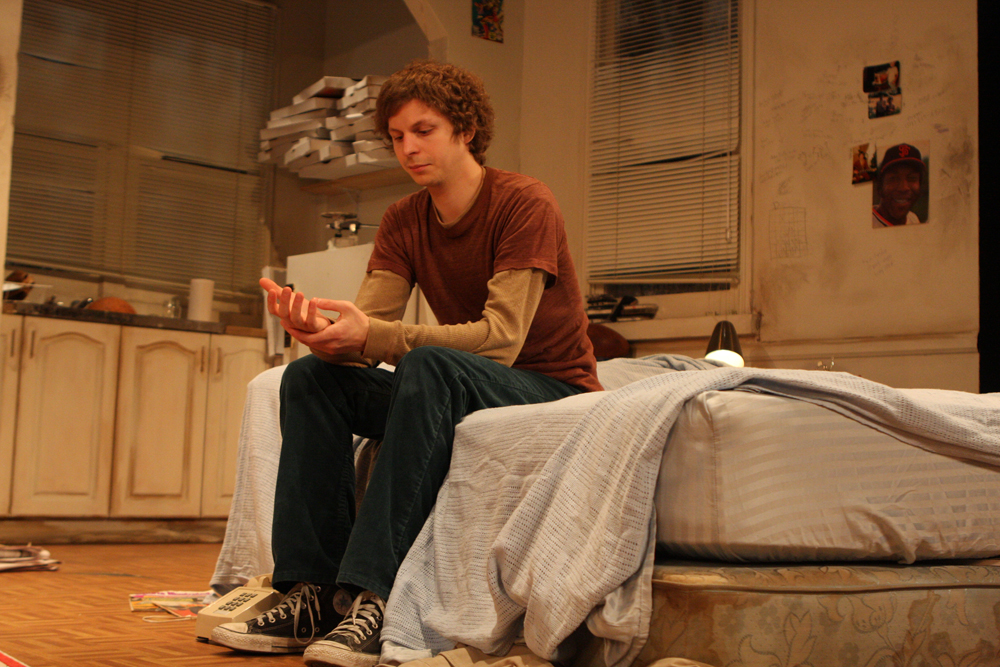Hollywood
3 millennials play terrific Gen-Xers in revival of Lonergan’s ‘This Is Our Youth’

Michael Cera in This is Our Youth. Photo by Eva Rinaldi / Flickr.
NEW YORK—Ah, youth. It’s messy, confusing, possibly dangerous—particularly when enveloped in a marijuana haze.
A truly well-oiled—should we say well-rolled?—revival of Kenneth Lonergan’s “This Is Our Youth” opened Thursday on Broadway at the Cort Theatre with a super cast of rising-star millennials playing Gen-Xers.
Michael Cera, making his New York stage debut, once again perfectly captures being an awkward man-boy, while veteran fashionista and acting newbie Tavi Gevinson matches his goofy nervous energy. Kieran Culkin is marvelous as their smug, narcissistic friend. Spending two hours watching these wealthy, unmoored slackers is a treat, even without the contact high.
The production, which premiered at the Steppenwolf Theatre Company in Chicago this past summer, is directed by Anna D. Shapiro, who knows her way around onstage arguments (“August: Osage County”) and movie stars (James Franco in “Of Mice and Men”). She keeps this revival fresh and electric, crackling with energy even as the stoned get more stoned.
Set in 1982 at the beginning of the Reagan Era, the entire play takes place over two days at the Upper West Side apartment of Dennis (Culkin), a small-time drug dealer with wealthy parents. He gets an unexpected visit from his weird friend Warren (Cera), who fled home after having a disagreement with his dad and taking $15,000 (“the proceeds from my unhappy childhood”).
They come up with a dangerous plan to return the money and avoid punishment. It involves spending more of it on cocaine, reselling it and then attempting to use the proceeds to get Warren hooked up with his secret crush, Jessica (Gevinson).
Lonergan’s script is baked with fun as these hyper-intellectual, born-with-a-silver-spoon, sushi-eating kids pretend at being well-adjusted humans, all the while tossing around SAT prep words like “prototypical” and “expedient.”
These are people who shop for smoked salmon at Zabar’s, drink Dom Perignon and have enough upper-class breeding to run to a Plaza Hotel suite in order to romance a girlfriend. (Not Dennis, though: He thinks the snazzy Pierre hotel is better). But none can pay for it with their own cash.
Cera’s Warren is gloriously unpolished, a guy with his hand permanently stuffed into a pants pocket and a collection of toy memorabilia. He moves jerkily, as if he’s uncomfortable in his own skin, and he’s antsy enough to just pick up a football and toss it indoors like the boy he once was. Watching him finally stick up for himself at the end is glorious.
Culkin, with his flippy haircut and polo shirt, is smarmy ‘80s perfection. He’s that cocky boyfriend in a John Hughes movie who initially attracts Molly Ringwald only to be revealed for the boor he really is. Dennis fancies himself a leader and entrepreneur but is insecure enough to want to be worshipped for being a leader and entrepreneur. He probably grew up to be a stock broker who wore suspenders and lost everything in the dot-com bubble.
Gevinson walks into this drug-fueled morass with an innocence, integrity and sincerity that’s refreshing. She’s as ardent as Warren about her opinions and dances like, well, Molly Ringwald in “The Breakfast Club.” She and Warren make a love connection but neither is mature enough to handle it, and it dissolves in a faux-fight so skillfully executed by Lonergan that neither really knows what happened.
This is a production that makes a sly nod to our own nostalgia. For example, everyone stops to stare at a ringing phone to wonder who is on the other side (it’s 1982, remember) and Culkin’s ability to snap the long, irritating phone cord like a lion tamer will remind you of pre-iPhone days. Todd Rosenthal’s single set with a Richard Prior poster, a clunky TV and crates of records also takes you back.
Little touches—like Vampire Weekend’s Rostam Batmanglij’s instrumental music between scenes that ranges from ominous to playful—add lustre to a show that’s very specific in terms of time and place but seems to capture each new generation as it finds itself in no man’s land—too old to play with toys and yet too young to really enjoy itself.
Online





















